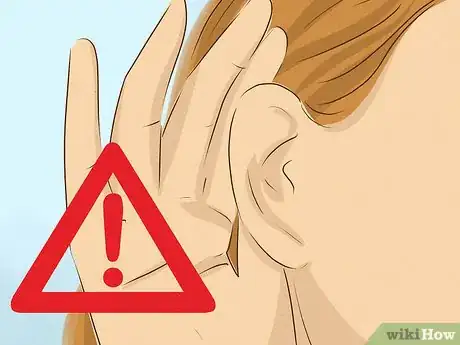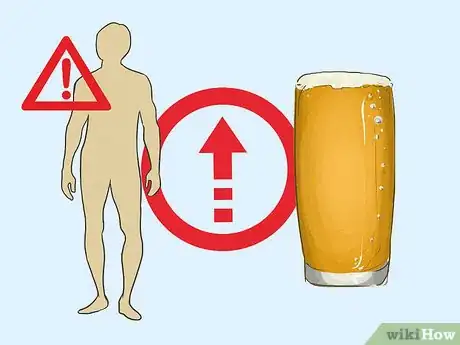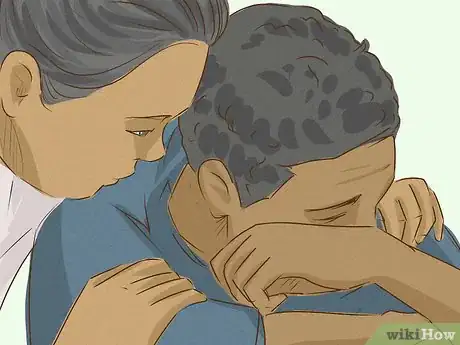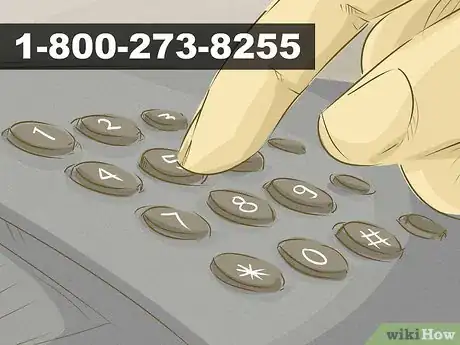This article was co-authored by Crisis Text Line. Crisis Text Line provides free, 24/7 crisis support via text. Those in crisis can text 741741 to be connected with a trained Crisis Counselor. They've exchanged over 100 million messages with people in crisis around the US and are rapidly expanding.
There are 13 references cited in this article, which can be found at the bottom of the page.
This article has been viewed 56,464 times.
If you have a friend contemplating suicide, you may be scared and unsure of how you can reach out to help them. You may be worried you may say the wrong thing or afraid you can’t handle the responsibility. Know that you are not alone and that there are many ways for you to get help to support your friend.
If you need immediate help and are in the United States, call or text 988 or call 1-800-442-HOPE to talk to trained professionals. You can also text 741741 to chat with someone from the Crisis Text Line. If you aren't in the United States, contact the suicide prevention hotline for your country. Call emergency services in your country, such as 911 in the US, if you believe your friend’s life to be in imminent danger. Take any threat of suicide seriously.
Steps
Assessing the Situation
-
1Listen for suicidal ideation. Suicidal ideation is having and/or expressing thoughts of suicide.[1] Perhaps you have become concerned because your friend expressed thoughts of suicide, or made a statement like, “The world would be better off without me.”
- Remain calm and try to get as much information as possible. You want to determine, to the best of your abilities, if you think this person is in imminent danger of hurting themselves. Do not interrogate them (even though you will probably want to); rather, spend most of your time listening, asking occasional questions.
- Other examples of suicidal ideation you might hear include things like, “I wish I was dead,” “Everyone would be happier if I was gone,” or “It would have been better if I were never born.” Your friend might also seem hopeless about life in general or a particular situation, or you may have noticed very sudden personality changes in your friend (extreme depression or anxiety, for example).[2]
- Remind your friend you are there for them. You could say, “Thank you for telling me this. You mean a lot to me, and I want to support you.”
-
2Look for behavioral changes or clues. Suicidal people often follow similar patterns of behavior. Consider if you’ve recently seen any of the following in your friend:
- Increased drug or alcohol use
- Change in their normal routine; for example, sleeping more or less, or not going to school or work
- Mood swings or other personality changes
- Reckless or self-destructive behavior (using drugs, driving recklessly)
- Giving away possessions, particularly important ones[3]
- Looking for a way to kill themselves; for example, researching suicide methods online
- Saying goodbye to people in a way that makes you think they are saying goodbye forever.[4]
Advertisement -
3Watch for other signs of suicide risk. There are warning signs you can look out for in someone who may be contemplating suicide or going through some kind of distress, which could possibly lead to suicide. These may include:
- Unbearable feelings. Is the person who is expressing suicidal ideation (SI) feeling hopelessness, helplessness, worthlessness, despair, and/or self-doubt? Usually, the more intense these negative emotions are the more "unbearable" it is for the person experiencing them, and the more likely it is for suicide.
- Preparing to die. Does the person’s behavior reflect that they are "taking care of business" or making final plans. I.e., preparing wills, life insurance, giving away valued possessions, or making verbal references to what others may or may not do after they are gone?
- Rehearsing suicide. Has this person been rehearsing suicide, such as discussing various methods of how they would take their own life? For example, they might talk about killing themselves with a gun, knife, rope, overdose and/or drug abuse, car crash, or walking into traffic.
- Changing behaviors. Pay attention to the behaviors of someone who you think may be contemplating suicide. Are they using drugs or alcohol? Be aware that when emotionally unstable people are under the influence of alcohol or drugs, the impulsivity of their behaviors increase as well and they may make unsound rash decisions to act out their suicidal thoughts.
- Isolation. Is the person disconnecting from friends and family? Are they increasingly isolating themselves?
- Prior mental health issues. Is there a prior mental health diagnosis? Sometimes, someone who is experiencing mental illness and is not properly supported with connections to formal and informal support systems may be at higher risk of experiencing SI.
-
4Ask if they have a plan. Try to determine if the person has a plan to kill themselves. Ask the person if they know their timeline and method. For example, have they stockpiled pills, or do they have access to a weapon? Have they written a note to be left behind?
- If a person has a plan they can articulate to you, you need to act very quickly. The more detailed the plan is, the more likely it is that the individual will act on it.[5]
- You could say, “Have you thought about how you would do it? Do you know when you would do it?” Ask questions in a matter-of-fact way. Even though it is extremely disturbing news, remain calm and non-judgmental.[6]
- Do not be afraid to ask your friend these direct questions. Asking them about suicidal thoughts or plans will not cause them to act upon them.
-
5Call emergency services if necessary. If you believe that you are in an emergency situation, that a suicide attempt is about to or has already happened (if you believe the person ingested pills, for example), call emergency services, such as 911 in the US, immediately. It is better to have called and been wrong than to have ignored your gut feeling.
- For example, say your friend calls you in the middle of the night and sounds very different. They share with you their thoughts of suicide and suddenly they are silent. While it is possible they have fallen asleep, you are not able to rouse them through the phone. If they live alone or you do not have a way to contact anybody they live with, this is a time to call emergency services.
- If you do not believe the person is in immediate danger, call a suicide helpline first to have them help you assess the situation and determine the next steps you should take.
- Another option is to call the person’s therapist, primary care provider, or psychiatrist (if there is one). Having accessible, trained help will help both of you during this time of crisis.
-
6Stay with your friend. If you believe that your friend is at high-risk for suicide, do not leave them. Stay with the person until someone else that your friend trusts is able to be there, or reach out for professional help.[7]
- Keep talking to your friend until additional help arrives. Make sure there is nothing around the person that they could use to harm themselves. [8]
- Figure out what makes your friend calm and comfortable, and go with that. If it seems like your friend seems calmer with your quiet presence, it might be better to sit quietly with them and offer reassuring support by holding their hand or sitting closely to them. If your friend seems reassured by your voice, keep talking.
- Talk to your friend about what they mean to you, the fun times you’ve had, or favorite memories together.
Listening and Talking to Your Friend
-
1Believe them. Take them at their word. Suicidal threats are not something to be taken lightly. Beyond their expressed suicidal ideation, you can look for warning signs in their behavior[9]
- Don’t joke about it. People who are suicidal are not in a normal state of mind, and you can’t be sure how they would react to a joke like, “Yeah, life sucks, man.” They may take your joke as validation or permission.
- If you are not sure whether or not they are serious, err on the side of caution and seek help. It is better to have done too much and risk embarrassment, than to do have done nothing and risk a lifetime of “what if.” Even if the person laughs off your attempt to intervene, it will send a message that they matter and are valued.
-
2Be present. Your presence and a good listening ear can be some of the best gifts you can give a person in crisis. Be empathic and imagine what you would like from a friend if you were suffering from depression and suicidal thoughts.
- Feel comfortable in silence. Sometimes well-meaning people attempt to fill uncomfortable silences or try to cheer up friends who are having a tough time, and unintentionally end up saying the wrong thing or making the situation about themselves. When in doubt, silence is best.[10]
- Sit with them. If your friend is sitting on the floor, sit there, too. Sit close to them and, if you are comfortable, hold their hand or put your arm around their shoulder.
- Let them talk. Or let them cry, or sit in silence. Follow their lead.
- For example, if your friend is crying, you may be tempted to say, “There, there, it’s okay, stop crying.” But it is much healthier to let the tears keep flowing and not pressure your friend to stop. Stay quiet while your friend cries, and perhaps hold their hand or hug them if it’s appropriate.
- Give your friend some time to answer questions or respond to you. Not responding to your question doesn’t mean they didn’t hear you, they may just be deep in thought.[11]
-
3Use active listening. This is a great way to show a person that you are really listening and for the person to know that they are being understood. Your job as an active listener is to paraphrase the speaker’s statements to let them know what you are hearing, as well as how it makes you feel.[12]
- Paraphrase. Repeat back to them what you are hearing them say. Try to connect it to what you think they are feeling. For example, your friend might say, “I don’t know what to do anymore. Everything I do seems like a failure,” and you could respond, “It sounds like you are feeling very helpless.”
- The good thing about paraphrasing is that it helps both you and the speaker clarify the speaker’s feelings. For example, if you say, “Wow, you sound really angry!” and the speaker responds, “I think I’m more frustrated,” it helps both of you have a better understanding of the true emotion behind the words.
- Reflect back. This means that you let the person know how you feel after hearing their statement. For example, you could say, “When you said that you feel like nobody cares about you, I felt really sad, because it must be awful to think that. I want you to know that’s not true, though. I’m sitting here with you right now and I care about you.”
-
4Ask questions. Don’t pepper your friend with questions, but asking occasional questions to gain understanding is okay. It’s good to keep the person talking.[13]
- You could ask your friend questions like, “Can you tell me more?” or “How did that make you feel?” to continue the conversation.
- Ask your friend what you could do to help them right now. You could ask, “What could I do right now to support you? How else can I help?”
-
5Avoid platitudes. Common “chin up” comments like “You’ll be okay,” “You’ve got this,” or “Cheer up, it’s not so bad!” are not helpful in crisis moments. Your friend is at their darkest point and feels completely hopeless. They do not believe they will be okay.[14]
- When you are tempted to try to cheer your friend up, a better strategy might be to acknowledge their sadness instead of paraphrasing or reflecting back. For example, “Don’t feel bad, you’ve got so much going for you!” would be better rephrased as “It sounds like you’re under so much pressure, it must feel really overwhelming sometimes.”
-
6Refrain from giving advice or telling your own stories. This focuses the conversation and the energy onto you, when it needs to be entirely about your friend.
- Avoid the use of the word “should.” You are telling your friend what to do, and it sounds like it is coming from a place of authority or superiority. The word “should” also implies that you do not accept the person for who they are.[15]
- For example, while “You should really talk to a therapist ASAP” is probably the correct step for your friend to take, it also implies that they have failed for not having done that already. A better way to say this might be, “I will call the helpline right now and help you look for a counselor. Maybe we can set up an appointment for you tomorrow.”
- Now is not the time for your anecdotal advice. Don’t say something like, “My cousin was an inpatient at a psychiatric hospital for a couple of weeks when he was really depressed, maybe you could try that.”
-
7Refuse to keep secrets. Your friend may ask you to promise not to tell anyone. This is not a promise you should keep. You need to get help for both your friend and yourself, because this is something bigger than you can handle alone.
- Let your friend know that you will keep in confidence what they told you about the problems that led them to feel suicidal. For example, you can promise that you will not share the news of your friend’s unintended pregnancy, or that their father is physically abusive.
- For example, you could say, “I promise that I will not tell anyone about your problems at home. But I need to call the helpline so I can learn how to be a good support to you. This is more than I can handle on my own.”
-
8Let your friend know how much they mean to you. While your friend is in a very dark place and it may seem like your words are falling on deaf ears, do your best to bring them a glimmer of light by letting them know their importance in your life. Think of all the value your friend brings to the world, and share it with them.
- For example, you could say, “One thing that I appreciate so much about you, Jenna, is that you have such a big heart. You care so much about other people and connect with them so well. There would be a hole in so many people’s hearts if you left us.”
- Try to point out the people that love them and attempt to magnify it. “Kevin still talks about how you took the blame for breaking that window, because you knew his parents would be much worse to him than yours would be. You’re always standing up for others.”
- Validate how your friend is feeling. Then, remind them that they may not feel this way forever and that they have support. Try saying something like, “I’m sorry for what you’re going through and how you’re feeling right now. But remember that feelings pass and you may not feel this way in a couple of weeks or possibly even sooner. I’m here for you and I want to help in any way I can.”
Getting Outside Support
-
1Tell someone you trust. Talk to someone who can help you deal with this situation. This is not something you can handle on your own. You need the support of mental health care professionals, family, and friends.
- If you are a teenager, talk to an adult like a parent, teacher, or counselor. Adults need to be responsible for this situation; suicide prevention is too much of a responsibility to be left to you and your friends.[16]
- If you are an adult, think of someone who could offer you guidance and support, like a friend with a mental health care background, or speak to a professional for guidance.
-
2Call a suicide helpline. You can call a suicide helpline yourself to get advice and support as to how you can support your friend. The helpline can listen to your concerns as well as point you toward resources in your community.[17] Don't hesitate to call. The 988 Suicide and Crisis Lifeline is open 24/7 and is completely confidential. Call or text 988.
- Give your friend the phone number and let them know they can call it whenever they need to. You could say, “Call this number in case you can’t reach me. They’ll be able to help you, too.”
- If you or your friend feel more comfortable texting someone, reach out to a trained crisis counselor at the Crisis Text Line by sending a message to 741741. For more information, visit https://www.crisistextline.org.
- You can also use social media platforms to address suicide concerns. For more information, go to http://suicidepreventionlifeline.org/help-someone-else/.
-
3Get support for yourself. Helping a friend through a suicidal crisis is very emotionally draining. You may feel exhausted or emotional afterward. Reach out for support from family, friends, or a mental health care professional if you need to talk more about it. In some instances, dealing with a suicidal person can truly be traumatic, and it may be helpful to seek counseling to help you heal.
- Consider calling a suicide helpline and talking to a counselor about what you have been through. They can also direct you to resources in your area that may be helpful to you.
- Talk to trusted members of your support network, like close friends, a trusted teacher, or clergy. Protect your friend’s privacy, and focus the conversation on the challenges you faced in helping your friend, not on your friend’s troubles.
- Take care of yourself. If possible, take some time to yourself to rest and regroup with a favorite activity. Consider participating in your favorite sport, going for a walk, or meeting a friend for coffee.
Expert Q&A
-
QuestionWhat if I'm suicidal and cut and I have friends that cut as well—what should I do?
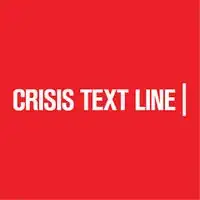 Crisis Text LineCrisis Text Line provides free, 24/7 crisis support via text. Those in crisis can text 741741 to be connected with a trained Crisis Counselor. They've exchanged over 100 million messages with people in crisis around the US and are rapidly expanding.
Crisis Text LineCrisis Text Line provides free, 24/7 crisis support via text. Those in crisis can text 741741 to be connected with a trained Crisis Counselor. They've exchanged over 100 million messages with people in crisis around the US and are rapidly expanding.
24/7 Crisis Counseling Reaching out for help is a great first step. It sounds like you and your friends are hurting and it's important to know that help is out there. Consider talking to family or friends and asking for support. Get connected with a mental health professional if you are able to do so. Talk to your friends about how to keep each other safe and make a list of things that help when you are feeling this way. Know that there are hotlines and similar services in moments of crisis and remember that you are strong and the way you are feeling right now may not be how you feel forever.
Reaching out for help is a great first step. It sounds like you and your friends are hurting and it's important to know that help is out there. Consider talking to family or friends and asking for support. Get connected with a mental health professional if you are able to do so. Talk to your friends about how to keep each other safe and make a list of things that help when you are feeling this way. Know that there are hotlines and similar services in moments of crisis and remember that you are strong and the way you are feeling right now may not be how you feel forever.
Warnings
- Never leave the person alone during this crisis time. Seek out the assistance of professionals. There is a reason why most mental health and medical facilities will place a person in one-on-one care if there is an expression of SI.⧼thumbs_response⧽
References
- ↑ http://www.aafp.org/afp/1999/0315/p1500.html
- ↑ http://www.mayoclinic.org/diseases-conditions/suicide/basics/symptoms/con-20033954
- ↑ http://www.mayoclinic.org/diseases-conditions/suicide/basics/symptoms/con-20033954
- ↑ https://afsp.org/about-suicide/risk-factors-and-warning-signs/
- ↑ http://www.suicide.org/how-to-help-a-suicidal-person.html
- ↑ https://wmich.edu/suicideprevention/basics/how-help
- ↑ https://crisiscentre.bc.ca/frequently-asked-questions-about-suicide/
- ↑ https://wmich.edu/suicideprevention/basics/how-help
- ↑ http://www.mayoclinic.org/diseases-conditions/suicide/in-depth/suicide/art-20044707?pg=1
- ↑ https://www.crisisprevention.com/Resources/Knowledge-Base/De-escalation-Tips
- ↑ https://www.crisisprevention.com/Resources/Knowledge-Base/De-escalation-Tips
- ↑ http://psychcentral.com/lib/become-a-better-listener-active-listening/
- ↑ http://www.suicide.org/how-to-help-a-suicidal-person.html
- ↑ http://www.befrienders.org/helping-a-friend
- ↑ http://tinybuddha.com/blog/why-the-word-should-can-be-harmful-3-empowering-alternatives/
- ↑ http://teenshealth.org/en/teens/talking-about-suicide.html#
- ↑ http://suicidepreventionlifeline.org/help-someone-else/
